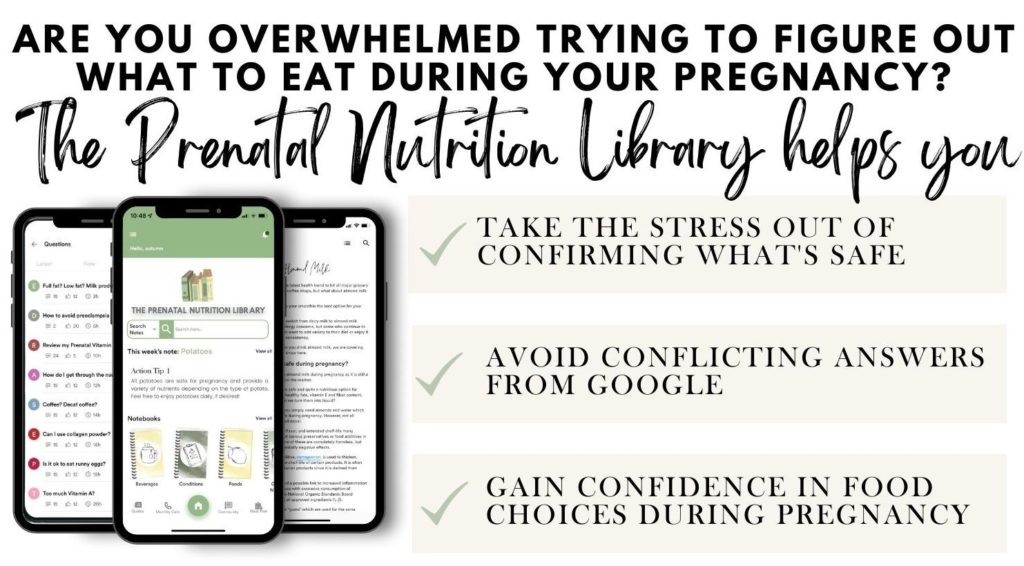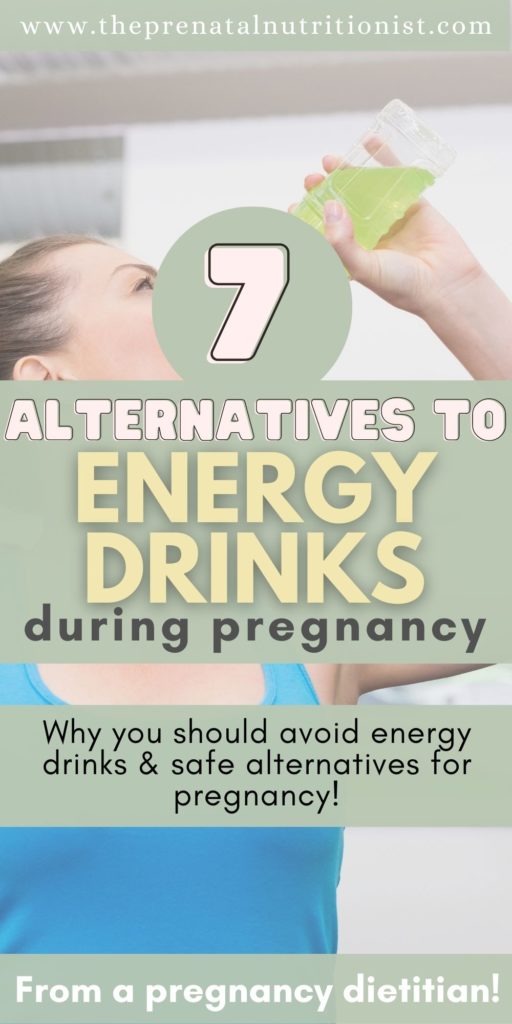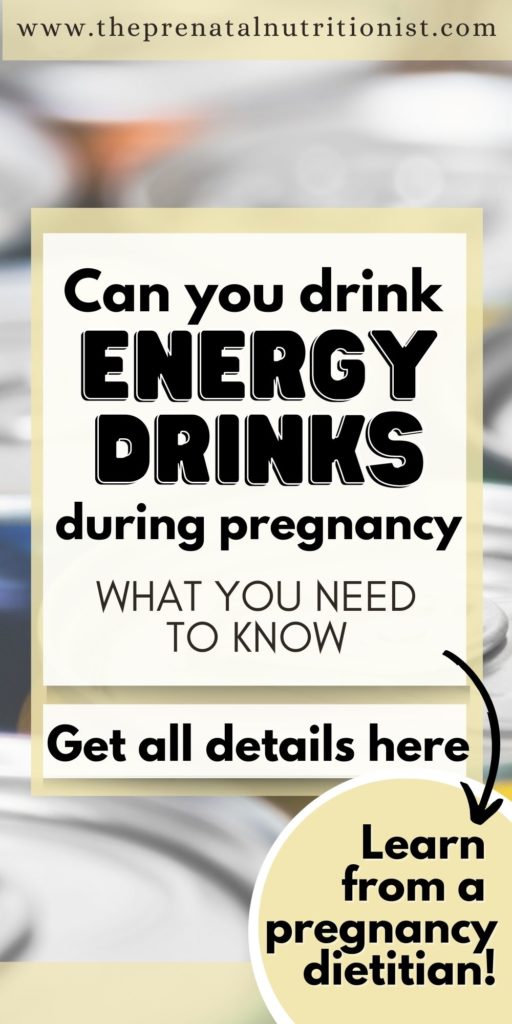
It’s not uncommon for pregnant women to feel tired all the time. Caffeine is commonly used to boost energy levels. Caffeine is commonly found in tea, coffee, soda, and energy drinks. (Read this post, “Is Coffee Safe During Pregnancy,” if you’re curious!). While caffeine typically doesn’t need to be avoided during pregnancy, it is best consumed in limited amounts. High levels of caffeine can be harmful during pregnancy.
The short-term effects of caffeine are usually felt between 5 and 30 minutes after it’s consumed. The most common effects of caffeine are increased heart rate, faster breathing, increased cognitive alertness, and physical energy.
Some people are more sensitive to caffeine than others. For some people, caffeine’s effects can last up to 12 hours. During the second and third trimesters of pregnancy, the half-life of caffeine increases. This means it takes longer for caffeine to clear from your “system.” That also means the effects of caffeine may be felt for longer.
Low energy levels often leave pregnant women desperate for an energy boost. We get it! Energy drinks are an attractive solution, but are they safe for pregnancy? In this post, I will discuss whether drinking energy drinks during pregnancy is safe.

Can You Drink Energy Drinks While Pregnant?
Doctors, midwives, and dietitians often recommend that women avoid drinking energy drinks while pregnant. Energy drinks typically contain high amounts of caffeine and other ingredients that could be unsafe or lack safety data for pregnant women. Additionally, there is no nutritional benefit to including energy drinks in your pregnancy diet.
The effect of consuming caffeine during pregnancy is one of the more widely researched topics in prenatal nutrition. The American College of Obstetricians and Gynecologists (ACOG) and widespread consensus suggests that up to 200 mg of caffeine daily is okay for most pregnant people. However, some research suggests further caffeine restriction is ideal—the bottom line, the less caffeine we consume, the better.
Energy drinks can also often be loaded with added sugars. Again, this is something to be mindful of for all pregnant people, not just those diagnosed with gestational diabetes. Artificial sweeteners isn’t the easiest answer either!
Energy Drink Components
Common ingredients in energy drinks are:
- Caffeine
- Taurine
- Glucuronolactone
- B vitamins
- Green tea extract
- Green coffee extract
- Guarana
- Ginseng
- Ginkgo biloba
- L-carnitine
- Sugar or artificial sweeteners
- Antioxidants
- Trace minerals
7 Energy Drink Alternatives For Pregnancy
Herbal Tea
Certain herbal teas can be a great go-to healthy drink during pregnancy. While some should be avoided during pregnancy, there are still so many different kinds to choose from that you’re bound to find one you’ll love. Plus, herbal teas are caffeine free.
A few great herbal tea options for pregnancy include ginger, peppermint, red raspberry leaf, lemon balm, and chamomile.
Fresh Pressed Juice
Many people feel a natural boost of energy after enjoying fresh pressed juice. They can be super hydrating and packed with essential vitamins and minerals to support a healthy pregnancy. It’s important to wash produce thoroughly before juicing. Additionally, juicing does remove the fiber from fruits and vegetables. It’s best to enjoy in moderation. Learn more about juicing here.
Chia Fresca
Chia Fresca is another popular energy drink alternative. It provides omega-3 fatty acids, plant-based proteins, antioxidants, and more.
To make chia fresca, combine 12 ounces of water and one tablespoon of chia seeds. Stir well, then set aside for 5-10 minutes. The chia seeds expand as they absorb the liquid. Add lemon or lime juice, and enjoy.
Lemon Water
Squeezing lemon juice into your water is an easy way to boost energy and nutrition. These benefits come without all the caffeine and added sugar in energy drinks. In addition, lemons are a good source of vitamin C, which may help to support energy levels naturally.
Add fresh-squeezed lemon juice or lime juice to a glass of water for a super refreshing pregnancy beverage. You can get even more creative by adding cucumber and mint!
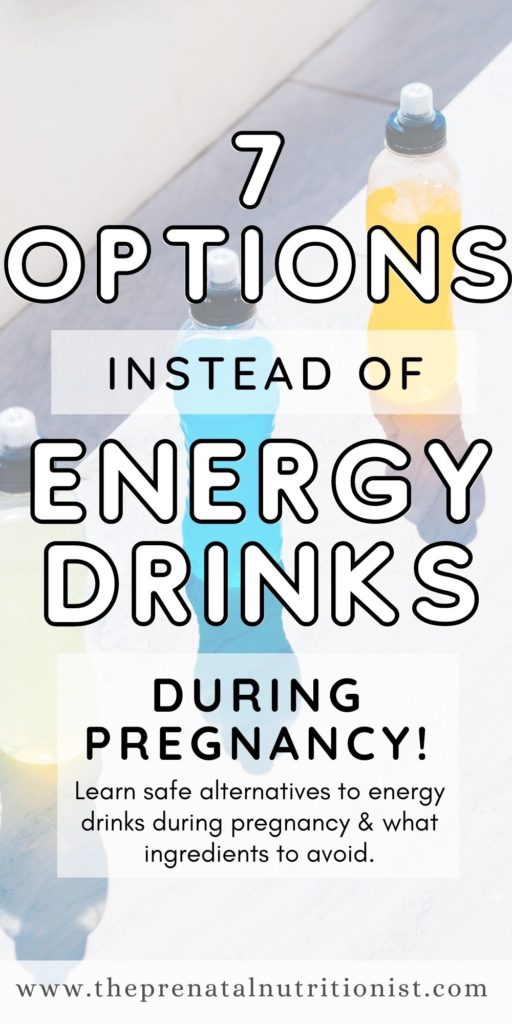
Coconut Water
Coconut water is one of the best drinks for pregnancy for several reasons. First, it’s a source of fluids and electrolytes and helps keep you hydrated. Coconut water contains potassium and magnesium, essential nutrients for healthy fetal development. Adequate magnesium and potassium also play a role in blood pressure management and reducing preeclampsia risk.
Plus, coconut water has a slightly sweet, slightly salty flavor. It’s incredibly refreshing and delicious. Remember that some coconut water beverages sold in stores have added sweeteners. I recommend choosing an unsweetened coconut water beverage. Most commercially prepared coconut water beverages are also pasteurized.
Smoothies
Smoothies can be a great drink option for pregnant women. Green smoothies, for example, are packed with beneficial vitamins, minerals, and fluids for pregnant women. Best of all, you can customize your smoothie with enjoyable ingredients.
You can choose the liquid base and which fruits and vegetables to include to create a super tasty and healthy drink. Please be sure to have fats and protein in your smoothie so you stay full longer and keep your blood sugars stable!
Pomegranate Juice
Pomegranate juice is a fantastic, caffeine-free alternative to energy drinks. It contains potassium, calcium, vitamin K, folate, and antioxidants. It could be as simple as adding a splash of pomegranate juice to your water. As with any juice, choosing an unsweetened option is ideal.
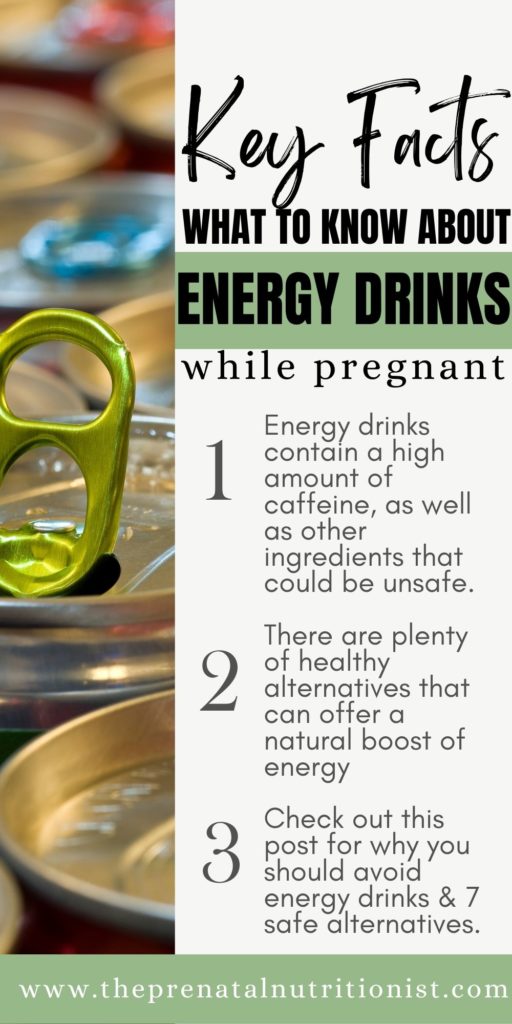
We recommend avoiding caffeine-loaded energy drinks during pregnancy and reaching for an alternative.
Energy drinks are popular among people looking for an energy boost or battling fatigue. But, unfortunately, they’re not recommended during pregnancy. This is because of their high caffeine content, added sugars, and other potentially harmful or questionable ingredients.
Fortunately, plenty of healthy alternatives can offer a natural energy boost and other nutrients to support a healthy pregnancy.
Sip confidently and learn more about caffeine, herbal teas, caffeine-free alternatives, and HUNDREDS of other pregnancy nutrition topics when you join The Prenatal Nutrition Library (TPNL). The first searchable app for food during pregnancy. TPNL gives clear, real-life answers to guide you through a healthy, feel-good pregnancy. See what our members have to say below!
